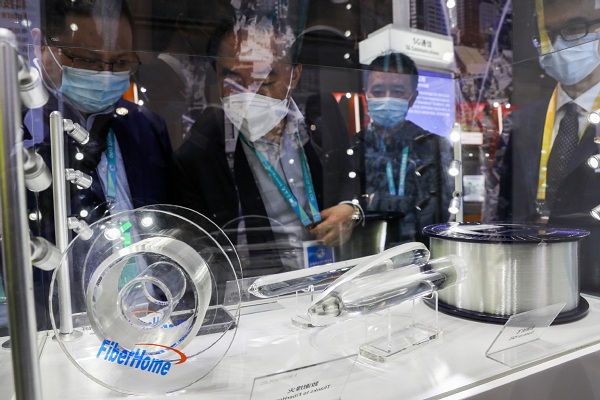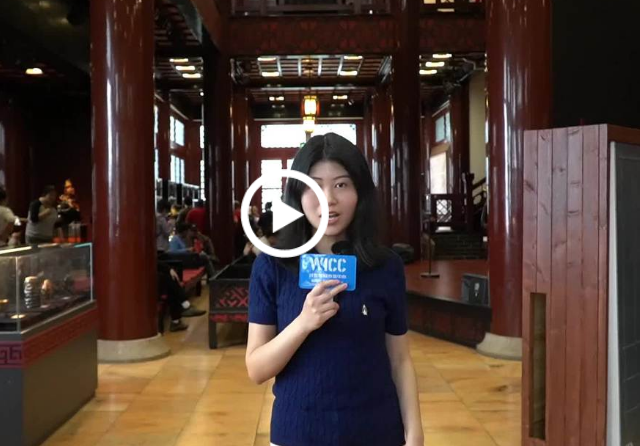Engineer goes the whole hog for breakthroughs in optical fiber, cable

Visitors observe a 3-meter-long stick made of optical fiber raw quartz material at the third China International Import Expo. [Photo/China News Service]
Luo Jie, chief technology officer of Yangtze Optical Fibre and Cable Joint Stock Ltd Co, a global leader in optical communication, feels a sense of mission to make a breakthrough in key technologies of China's optical fiber and cable industry.
In his view, building core competencies through independent innovation is of great significance for an enterprise to strengthen competitiveness, enlarge the product portfolio as well as expand global footprint.
"The whole network is connected by optical fiber. With the development of wireless technology, the demand for bandwidth and transmission rate is higher, which has given a big boost to the advancement of optical fiber technology," Luo said, underlining the significance of optical fiber in bolstering the development of superfast 5G wireless technology.
Established in 1988, YOFC was a joint venture of three partners. They are the former Ministry of Posts and Telecommunications, the Wuhan municipal government and Netherlands-based Royal Philips.
In the beginning, all of the manufacturing techniques related to optical fiber were introduced from Royal Philips, and the company just made products in accordance with foreign standards as they were unable to change the technical parameters and improve product performance, Luo said.
In 2000, YOFC established a research and development department and started its journey of independent innovation. Luo became the general manager of the R&D department after quitting his research job at Wuhan Research Institute of Posts and Telecommunications.
Luo and his team did a lot of research and conducted countless experiments in the face of tremendous pressure. Despite many failures, they did not give up.
In 2004, they finally solved the technical problem in the global optical fiber industry, namely utilizing the plasma chemical vapor deposition process and method for producing low water peak fiber, which has been widely applied in optical fiber network construction.
"Nowadays, we can design and manufacture on our own, and the categories of products become more diversified," Luo said. So far, YOFC has mastered three types of optical fiber preform manufacturing technologies and obtained over 700 invention patents at home and abroad.
Luo added he gains a sense of fulfillment when every new product his team developed can be applied to the large-scale construction of the country's telecommunication networks in a timely manner. After over 30 years, YOFC has successfully transformed from a follower to a leader in the global optical communication industry. The company has become the world's largest supplier of optical fiber, optical cables and fiber preforms.
It owns the national key laboratory in optical fiber and cable manufacturing technology, and has offered products and services to over 70 countries and regions around the world. YOFC has also stepped up its efforts to expand in overseas markets, establishing joint ventures in Indonesia, Myanmar and South Africa.
China is at the forefront of development and adoption of 5G.The nation has built more than 1.15 million 5G base stations as of mid-November, accounting for more than 70 percent of the global total, the Ministry of Industry and Information Technology said. The rapid development of 5G technology has prompted rising demand for optical fiber.
"We have the responsibility and mission to tackle several technology bottlenecks related to optical fiber. At present, there are more than 300 members on our R&D team, and the annual expenses for R&D account for about 5 percent of the company's total revenue."
In addition, Luo said the company has participated more in ITU-T-the telecommunication standardization sector of the International Telecommunications Union-which is responsible for developing new standards and revising existing standards for the global information and communications technology industry.
"There are about 10 standards for optical fiber in ITU-T, and we are currently responsible for four standards," Luo said, adding they have increased the power of discourse in the formulation of international standards for the optical fiber and cable industry.
At present, Luo spends more time studying cutting-edge technologies in the optical fiber and cable industry and learning about the development history of optical telecommunication networks, so as to offer more help and guidance to young engineers.




